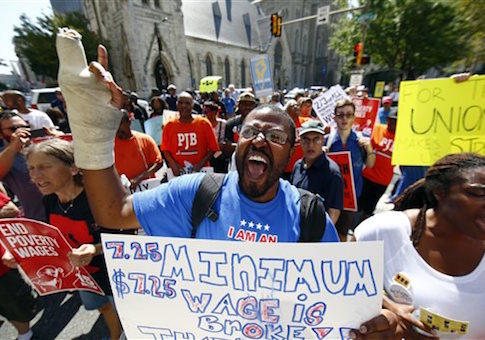Labor watchdogs and attorneys fear that the Republican midterm wave may embolden unions to advance their agendas through executive branch regulators.
"Think of it as an end-of-season sale. They’re going to try to get as many sales done as possible. There’s a rush to push things through," said Fred Wszolek, head of the Workforce Fairness Institute.
Unions have already taken advantage of the pro-labor landscape provided by President Obama’s appointees to the National Labor Relations Board, the top federal labor arbiter, and the Department of Labor.
The NLRB, according to Wszolek, has become a vehicle for the union agenda. Obama’s appointees to the board have overturned longstanding precedent that will ease future organizing efforts, including rules governing ambush elections and the formation of micro-unions.
"I would assume the next two years are going to be more of the same except worse," he said. "There’s not much you can do as a union legislatively."
House Republicans have proposed several bills to reverse controversial NLRB rulings, including the micro union decision that allows unions to organize retailers and other workplaces department-by-department, rather than storewide.
Sen. Lamar Alexander (R., Tenn.), who is expected to become chairman of the Senate Health, Education, Labor, & Pensions Committee, sponsored legislation to add a sixth member to the NLRB creating an even split of Democrats and Republicans on the board. Alexander’s bill also would have depleted the NLRB’s budget if it did not compromise and issue timely decisions.
Neither of those bills came up for a vote in the Senate during Sen. Harry Reid’s (D., Nev.) tenure as majority leader. Rick Grimaldi, attorney in the Government Solutions Practice Group of Fisher & Phillips, said Republicans would likely introduce similar legislation now that they have control.
"I think you’re going to see more bills coming out, but that legislation isn’t likely to go anywhere," Grimaldi said, citing President Barack Obama’s veto powers.
The Republican midterm wave is much more likely to embolden unions faced with a hostile legislative climate, according to Grimaldi. Labor groups will attempt to take advantage of Democrats’ 3-2 advantage on the current NLRB to advance their interests and establish new precedents that increase their power.
"I don’t think you’re going to see unions retrench. They’re going to double down," he said. "They see a labor friendly NLRB and have to act accordingly. They’re going to say ‘we have two years to still enjoy pro-union regulators.’"
The NLRB has proved more than willing to use its regulatory and enforcement scope to aid the union agenda.
General Counsel Richard Griffin, a former union attorney, gave unions targeting McDonalds a leg up when he announced that the fast food parent company should be held liable for the business practices of its franchisees in July. The NLRB could turn that opinion into law through the Browning Ferris case.
"This could change the face of small business in the U.S.," Wszolek said.
David Phippen, a management-side labor lawyer with Constangy, Brooks, and Smith, said that the NLRB and DOL rulemaking could also increase costs on employers during union elections, while also increasing union success.
The NLRB is currently considering whether to force companies to give union organizers access to the company email systems during union election campaigns and could have a decision within the next few months. At the same time, the Department of Labor is putting the finishing touches on the "Persuader Rule," which would force companies to disclose any outside legal or consulting help it receives to oppose unionization.
Many expected those rules to be issued in 2014, but the agencies have taken their time with the final decisions.
"There’s a good chance they were waiting to get the elections behind and see where they were," Phippen said. "It’s a hard sell in a bad economic time with limited job growth when they’re putting new [rules] out there that interfere with the employer’s ability to create jobs and have a fluid labor market."
Phippen is less pessimistic than Wszolek or Grimaldi about the next two years; businesses have already spent six years dealing with the uncertainty caused by the administration’s determined regulators and union organizers.
"I don’t see a difference in approach going forward. The continuing enforcement that they’ve been doing is enough," Phippen said. "Any time there’s aggressive enforcement, it raises costs for employers."
